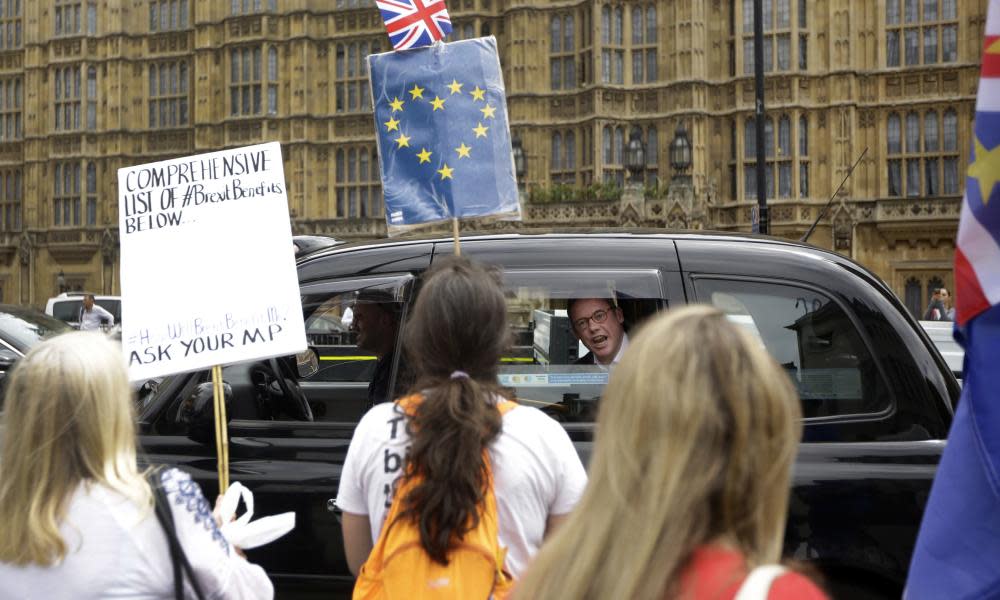Theresa May pushes forward £2bn no-deal Brexit preparations

Planning for a no-deal Brexit is expected to be ramped up this week with up to £2bn to be allocated to government departments after the cabinet signs off on the contingency plans at its weekly meeting on Tuesday.
Theresa May wants the increasingly serious no-deal preparations to dominate the Brexit discussion at cabinet, even though ministers worried about the stalled negotiations with Brussels are openly canvassing alternatives.
The prime minister’s official spokesman said there would be an announcement “shortly” about spending the Treasury’s £2bn contingency fund, and insiders indicated that would happen later this week after Tuesday’s meeting.
Downing Street was forced to insist that collective cabinet responsibility had not broken down after a string of ministers advocated either holding a series of Commons votes on a range of Brexit options or pushing for a “managed no deal”.
May’s official spokesman later told a Westminster media briefing that there were no plans to stage indicative votes on a range of Brexit options, including a second referendum, should May’s deal fail.
On Monday morning, the business secretary, Greg Clark, said if May’s deal did not pass “parliament should be invited to say what it would agree with”. He said in such a situation MPs should “take responsibility, rather than just be critics”.
The indicative vote idea is likely to be raised at cabinet, even though May ruled it out in the cabinet conference call held last Monday.
But insiders warned that a series of votes would inevitably be “a messy process” because parliament would have to agree on the procedure used, and each of the votes could in turn be subject to amendment.
Meanwhile, the foreign secretary, Jeremy Hunt, and the home secretary, Sajid Javid, both talked up a “managed no-deal” scenario should May’s negotiations collapse, where the UK would pay half of the £39bn owed, and quit the EU on World Trade Organization terms, starting after March 2019.
Downing Street, however, argued that the EU would not negotiate with the UK on that basis, and it was therefore impossible to achieve. Regarding no deal, the spokesman added: “The position they have set out there would not be discussions until after March 29.”
When Dominic Raab was Brexit secretary, he tried repeatedly to try to discuss a “managed no deal” with his EU counterparts, but was given short shrift, Whitehall sources added.
Downing Street said all cabinet ministers were united behind May’s deal. They had all stated “their commitment to getting the deal the PM has negotiated with Brussels through the House of Commons”, the PM’s spokesman said.
No 10 said talks were continuing between British and EU officials in an attempt to break the Brexit impasse after a difficult EU summit, in which May failed to persuade the EU to make a legally binding commitment to a date when future free trade deal would commence.
The idea was to provide a firm end date to the unpopular Irish backstop, which has been insisted upon by the EU as an insurance policy to avoid the return of a hard border in Ireland, but is the main reason for Tory MPs opposing May’s deal.
May hopes to secure additional clarifications or reassurances about the backstop over the next few weeks, before staging the meaningful vote to approve the Brexit deal in January, before the 21st of the month. Downing Street hopes rebellious Tory MPs will “calm down” over the Christmas period, and come round to the merits of May’s deal after considering realistically what the alternatives are.
Hard Brexiters and the Democratic Unionist party, which props up May’s government, say the customs backstop would, if enacted after the end of the post-Brexit transition period, leave the UK tied to the EU in a relationship that Britain could not easily escape.

 Yahoo News
Yahoo News 
